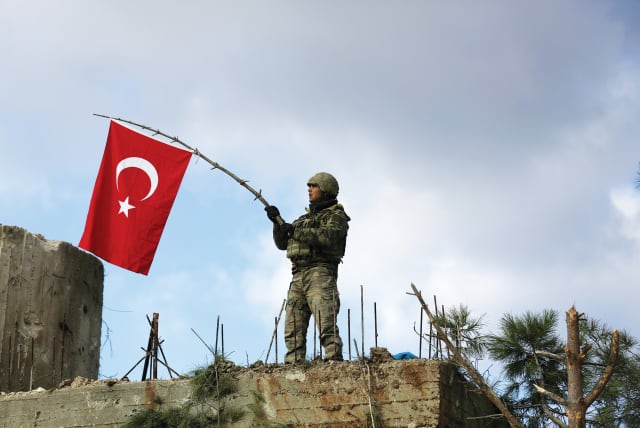Turkey reaches out to Syria as Damascus courts Amman - analysis

Turkey wants to normalize ties with Syria, but in order to do this it needs to see Damascus cater to some of Ankara’s demands.
Turkey would like to have better ties with the Syrian regime, but it wants Damascus to make changes to how it deals with Kurdish far-left groups, which Ankara considers terrorists.
It is “imperative to get some concrete results” in the fight against terrorism, Fahrettin Altun, the director of Turkey’s Directorate of Communications, was quoted as saying by Turkey’s state-run TRT (Turkish Radio and Television Corporation) on Monday.
Turkey says the US-backed Syrian Democratic Forces (SDF) are “terrorists” linked to the “PKK/YPG/PYD.” This acronym word salad is often used by Ankara as a catch-all for what it claims are terrorists, which includes women’s-rights activists, civilians in sports clubs, and others in Syria.
Turkey has sought for years to get Syrian rebels it backs in Syria to fight these Kurdish groups and remove Kurds from border areas, such as Afrin, and replace them with groups that Ankara backs. Today, Ankara’s policy is to try to get several million Syrian refugees in Turkey to go back to Syria. To achieve that goal, it needs better ties with Damascus.
Russia, which backs the Syrian regime, recently got the UN to close a border crossing from Turkey to northwest Syria, further isolating the areas of Idlib and Afrin, which Turkey occupies.
This complex situation means Turkey may want to normalize ties with Syria, but to do this, it needs to see Damascus cater to some of Ankara’s demands. In the long term, Turkey wants to work with Russia and Iran, as well as for Damascus to get the US to leave Syria.
Kurdish conflict
“We continue our engagement process with the regime in a quadrilateral format without preconditions and in good faith,” Altun said. “The Syrian regime should act in the same manner for this process to produce an outcome.”
Turkey backs the “territorial unity and integrity of Syria,” he said, adding that Ankara also wants to “create necessary conditions for the voluntary, safe, and dignified return of Syrian refugees and revitalizing the political process, which the regime has obstructed – [goals that] continue to be among Ankara’s main priorities in Syria.”
Turkey is also seeking to improve ties with Armenia, Israel, Egypt, the United Arab Emirates, and Saudi Arabia, Altun said.
“Today, again, we are in search of further strengthening our friendships and finding solutions to conflicting issues,” TRT quoted him as saying. “We witness that our trade volume with the Gulf region has grown more than 12 times in the past 20 years, reaching the level of $22 billion.”
Meanwhile, Damascus is working with Amman to combat drug smuggling.
“A new forum to combat drug smuggling from war-ravaged Syria through Jordan to the Gulf states held its first meeting in Amman on Sunday,” the Jordanian Foreign Ministry said, according to Riyadh-based Al Arabiya news channel.
Jordanian Foreign Minister Ayman Safadi met with Syrian President Bashar Assad in Damascus recently to focus on the illegal captagon trade that occurs in Syria, the report said. This trade fuels militias, which can create instability on the border of Syria and Jordan. Iran is likely behind some of this trade.
Syria pretends that it is not behind the drug trade, but its Iran-backed militia allies in southern Syria are behind the drug trade. As such, the Syrian regime plays both sides: It works with Jordan and enables the drug trade. It needs money, and drugs bring in billions of dollars, according to reports.
Damascus may be courting Jordan and taking this issue seriously.
“The Syrian delegation was headed by Defense Minister General Ali Mahmud Abbas and General Intelligence Director Major-General Husam Louka,” the Jordanian Foreign Ministry said. “Jordan’s was led by the chairman of Joint Chiefs of Staff, Major-General Yousef Huneiti, and General Intelligence Director Major-General Ahmed Husni.”
The talks focused on those who carry out the smuggling and the escalating danger to the entire region. This also can affect Israel because the Golan Heights border is near the area in Syria where drug gangs fuel instability.
The twin stories of Turkey talking up ties with Syria and Syria working on ties with Jordan show how Syria is now reentering its traditional role in the region as a bridge between Turkey and the Arab states of the Middle East.
The Assad regime once was more important in the region, and as a Ba’athist Arab nationalist regime, it positioned itself for regional leadership and worked closely with Moscow and Europe. It also played a key role in Lebanon and in empowering Hamas and working as a corridor for Iran’s influence. Thus, Syria was a bridge for Turkey, a NATO member, to the Gulf, and it also fueled Iran’s goals.
In the old days, when Saddam Hussein was in charge in Iraq, Baghdad served as a check on Iran’s role. Saddam even had influence in Syria, especially in the Euphrates River valley area among Sunni tribes there.
Turkey’s war against Kurdish groups, particularly the PKK, also influenced Syria, as the regime in Damascus both denied Kurds rights and hosted Kurdish dissidents.
On the other hand, Turkey wrangled concessions from Syria, such as the 1998 Adana Agreement, according to which Syria was supposed to expel the PKK and would let Turkey chase Kurdish suspects into Syria.
Turkey now occupies part of northern Syria, and Ankara will want to have permanent influence there if it leaves. Syria, meanwhile, wants to improve ties with the Arab states, positioning itself as a broker of deals today, rather than a site of civil war.
Jerusalem Post Store
`; document.getElementById("linkPremium").innerHTML = cont; var divWithLink = document.getElementById("premium-link"); if (divWithLink !== null && divWithLink !== 'undefined') { divWithLink.style.border = "solid 1px #cb0f3e"; divWithLink.style.textAlign = "center"; divWithLink.style.marginBottom = "15px"; divWithLink.style.marginTop = "15px"; divWithLink.style.width = "100%"; divWithLink.style.backgroundColor = "#122952"; divWithLink.style.color = "#ffffff"; divWithLink.style.lineHeight = "1.5"; } } (function (v, i) { });

